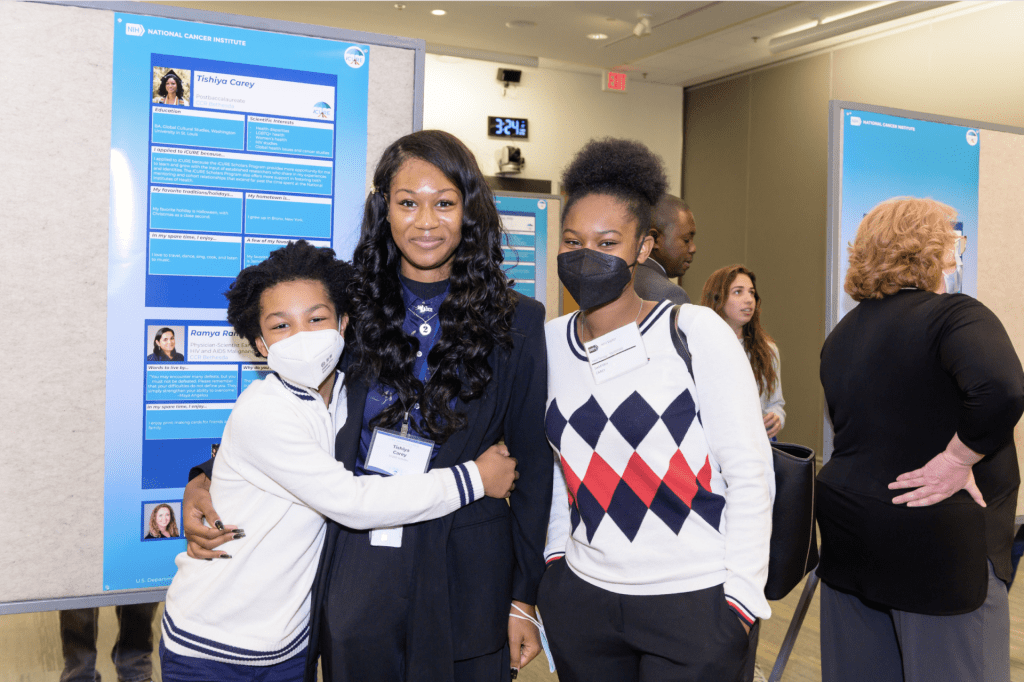
“It’s important to continue to build on things, it’s important to understand the context. It’s important to fully understand, I think, the impact of what it is that you want to do, what it is you’re trying to do, and how you’re trying to do it.”
After graduating from WashU in 2021, Tishiya “T” Carey landed her dream job at the intersection of her passions for medical research and community engagement working with the National Institute of Health (NIH) under the National Cancer Institute. She currently researches the associations between HIV and cancer and strives to understand how patients living with HIV can navigate challenges of cancer and age-related comorbidities.
Carey confessed to having been a “pre-med girl,” but when she embarked on her journey as a WashU student, she knew that her interests went beyond the medical field and theoretical practice. Her affinity for global cultures, health disparities, and community practice led her to apply and receive a spot in the Gephardt Institute’s Goldman Fellows Program.
“On the side of research, and I think, particularly in terms of health disparities research, that’s a really big passion of mine,” said Carey. “So, I was really excited to be able to work with the Goldman Fellows (now part of the St. Louis Fellows Program) and with an HIV/STI prevention and diagnosis treatment center. I worked with Williams and Associates and with a patient population that I love, and I continue to work with now.”
Carey shared that through the Goldman Fellows Program, she gained invaluable support in funding, networking, and establishing connections with other like-minded students in addressing health disparities. This experience was transformative, she said, as it opened her eyes to the pressing issues faced by low-income and minority families such as the lack of healthcare resources and consequences of historical factors like redlining.
“I got to see St. Louis very differently. [I visited] places I had never been and the…Williams and Associates office actually isn’t even that far from campus. It’s just past the Delmar Divide. I wouldn’t have known the [Delmar Divide] was there without their help and assistance,” she explained.
Carey also highlighted the benefits of learning about sustained community partnership.
“[WashU students] start these projects, and a lot of the time, they kind of stop when we [graduate],” Carey said. “So, I think it’s important that Gephardt does a lot to preserve relationships with community partner organizations.”
Beyond her current research, Carey organizes patient support groups to provide a safe space for individuals to seek advice and connect with others facing similar challenges. Carey highlights the importance of community and emotional support, particularly for individuals living with HIV, who often encounter stigma and discrimination.
She also appreciates that her current work allows her to bridge the gap between academia, real-life application, and disparities in clinical trials. The patients in her clinic are often minorities and of lower socioeconomic status.
“I think there’s a lot of different cultures and ideas and people in [HIV populations] that often don’t really get a voice or get acknowledged in the same way because of stigma, or because of weird ideas around sexual identity or, you know, religion, religious ideals,” said Carey.
For WashU students, Carey emphasized the importance of getting out of the “WashU Bubble,” finding good mentorship, placing oneself in spaces where timing and connections can align, and collaborating with other students.
Most importantly, she advises seeking passion over resume-building.
“You should do things that you’re passionate about. Because if you’re going into something like, ‘Oh, I just need to complete this thing,’ it’s less likely that you’re going to be connected to that work.”